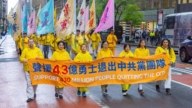【新唐人2014年06月23日訊】6月18號,中國新聞出版廣電總局發出「兩禁」通告:禁止記者站跨行業、跨領域採訪報導,並且禁止新聞記者和記者站未經本單位同意私自開展所謂批評報導。「兩禁」一出,海內外輿論一片嘩然,各種批評聲音不斷指向廣電總局。19號,廣電總局黨委書記蔣建國出面、對「兩禁」進行危機公關處理,他宣稱「兩禁被誤讀」。那麼,被誤讀的「兩禁」還會實施嗎?請看分析報導。
據中共官媒報導,6月19號,中共廣電總局黨委書記蔣建國接受大陸記者專訪,他出面解釋前一天掀起輿論大波的所謂「兩禁」通知。蔣建國說,之所以強調記者開展批評性報導要經過本單位同意,是一貫的所謂規範性要求,也是因為目前查處的新聞敲詐、和假新聞案子中,有相當一部分是個別記者未經本單位同意,私自以批評報導作為要挾。
去年以來,中共延緩年檢的報刊有216種,停辦的有76種,暫緩檢驗記者站193個、註銷49個,註銷新聞記者證14455個。
大陸作家李承鵬發「微博」指出,廣電總局的規定「禁止記者私自開展批評報導」,是一個病句。如果批評都需要領導恩准,那就不叫批評,叫撒嬌。而下命令的組織也該改名為「國家撒嬌測試中心」。
原大陸《杭州生活週刊》主編,現任《亞洲新聞週刊》總監黃金秋透露,「兩禁」的內容多年來,一直在暗地裡執行,只不過中共現在覺得,作為「潛規則」已經不足以約束媒體人,才把它公布開來。
原大陸《杭州生活週刊》主編: 「公開之後,它臉上掛得住嗎,掛不住它總是要去掩飾一下,但是他們的目地從來沒有改變過,在方法上他們可能覺得做了件蠢事,不應該以通知的方式把它發出來,它以後可能會採取以前傳統的方式,打電話、用宣傳部的會議直接給媒體的老總去講這些事情,文件都不發,可能採取這種方式。」
美國紐約城市大學政治學教授夏明:「一種就是它認為政治的厚黑術是可做不可說的,如果你把它說出來,它就否認,另外它是不斷的在縱深滲透和侵犯人們的權利和自由,進行試探,如果老百姓反映過度的話,會收斂一點,如果老百姓很麻木的話,它就會更囂張一點。」
中共在「法輪功」問題上,從97年開始在小范圍污衊法輪功,慢慢發展為沒收邊遠地區法輪功學員書籍,再發展到在天津抓捕法輪功學員,引發99年4月萬名法輪功學員到中南海上訪。
事後,為了息事寧人,由中共中央辦公廳、和國務院辦公廳信訪局發出聯合公告,聲稱﹕謠傳的「公安機關就要對煉功者進行鎮壓」,和「黨團員、幹部參加煉功就要開除黨(團)籍和公職」等,法輪功學員不要相信。當局還聲稱,「對各種正常的煉功健身活動,各級政府從未禁止過;人們既有相信並練習某一種功法的自由,也有不信某種功法的自由」。不過,中共政權在隨後的3個月後,開始了對法輪功長達15年的殘酷迫害,直到現在也還沒有停止。
最近,中共官方通過一系列舉措,壓制不同聲音。維權律師浦志強被正式逮捕,罪名是「尋釁滋事」和「非法獲取個人信息」。另外,江西新余市三名參與倡議政府官員財產公示者被判入獄、中央刊物對導演張藝謀作品《歸來》的指責,以及中紀委官員譴責社科院助長西方勢力等,都使民眾想起「文化大革命」期間,各界之間的無端指控。
夏明:「如果你接受它,服從它,對它還抱有幻想,它就可以忽悠老百姓,就可以生存下去,如果你對它完全失去信心,大家又採取自保政策,然後大家又組織起來的話,那麼我相信中共政權的崩潰是很快的。」
目前,在中國大陸掀起的「三退大潮」,已有1億6000多萬中國人在網上聲明「退出中共組織」,中共的喪鐘似乎也被漸漸敲響。
採訪編輯/劉惠 後製/肖顏
How Should The Two Nos Report Be Interpreted?
On June 18, the Chinese Press and Media Administration
issued the Two Nos notice.
The notice states that cross-disciplinary coverage
of the news as well as reports and analysis of news
not approved by the administration are forbidden.
This release immediately drew a large amount of criticism
of the administration.
On the June 19, Party Secretary of the Press and Media
Administration, Jiang Jianguo, declared that the Two Nos
were misinterpreted.
Then, will the Two Nos be implemented?
The following is our analysis and report.
The Party Secretary of the Communist press and media,
Jiang Jianguo, explained the Two Nos to Chinese media.
Jiang indicated that the approval of the report has been
a consistent and standard request of the administration.
The Two Nos are also a response to recent news cases
of extortion and false reports in which individual reporters
were blackmailed, reported Chinese media on June 19.
Last year, the Communist regime delayed its annual
assessment of 216 newspapers, closed 76 newspapers,
suspended inspection of 193 reporter stations,
and canceled 14,455 news reporter certificates.
On Weibo Chinese writer Li Chengpeng criticized
the ban on reporting or criticizing without approval.
He stated that by having to receive approval, the critics
are doing nothing but buttering up.
The administration should be renamed
the “National Butter Up Test Center."
Asian Newsweek director Huang Jinqiu reveals that
the Two Nos have been secretly executed for years.
These “hidden rules" are no longer constraining journalists.
Thus, the reason for the CCP’s current publication.
Huang Jinqiu: “It has lost its face after publicizing the rules.
Now they are trying cover it up, realizing they have done
something stupid.
They have never changed their purpose.
Instead of publicizing it, they might resort to their old habit—
calling a meeting to convey the idea to the head of the media.
No more notice. That could be the approach."
Political Science Professor at the City University
of New York, Xia Ming: “For one, it is a political
‘thick face, black heart’, (concealing and imposing
will on others) which can be acted out but not spoken.
Once it is spoken of, it will be denied.
The other is that it is testing how to further infiltrate
and intrude upon the rights and freedom of people.
If people react strongly, it will restrain itself a little.
However, it will become more aggressive
if people have no response."
The same tactics are used in the persecution of Falun Gong.
In 1997, the regime conducted the slander of Falun Gong
on a small scale, then confiscated Falun Gong books
in remote areas, and furthered the arrest of Falun Gong
practitioners in Tianjin.
This resulted in tens of thousands of Falun Gong practitioners
petitioning at Zhongnanhai in April of 1999.
Later, in order to calm the public, the Central Committee
and the State Council jointly announced, “Falun Gong
practitioners should not believe the rumors such as “the public
security organs must crackdown on the Falun Gong
practitioners," and “party members, cadres will be expelled
from the party or the post if they participate in the practice."
It also claimed, “The authorities have never banned
any normal exercises or fitness activities; people
have the freedom both to believe and to disbelieve
any certain practice or exercises."
However, three months later, the communist regime
began the brutal persecution of Falun Gong.
To this date, the persecution has lasted for 15 years.
Recently, the Communist officials have suppressed dissenting
voices via a series of activities.
Human rights lawyer Pu Zhiqiang was formally arrested
on charges of “provocation" and “illegally accessing
personal information."
Three Xinyu City, Jiangxi Province activists were sentenced
for calling on officials to declare their property.
Film director Zhang Yimou’s work “Return" was condemned
by the Central publications.
The Chinese Academy of Social Sciences was accused
of “promoting Western forces" by the Central Commission
for Discipline Inspection.
These activities have reminded people of the groundless
accusations during the Cultural Revolution.
Xia Ming: “If you accept it, obey it, and hold illusions,
it can fool people and continue to survive.
If all confidence is lost, if everyone adopts policies to protect
themselves, and if everyone works together,
I believe the communist regime will collapse soon."
Currently, the awakening of the Chinese has led to more than
160 million Chinese denouncing the Chinese Communist
Party and its affiliated organizations.
The death knell for the CCP is continuously sounding.
Interview & Edit/Liuhui Post-Production/Xiaoyan




























